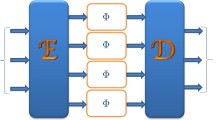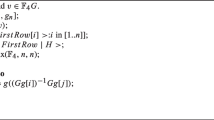Abstract
In 1990 Cooper suggested to use Groebner bases’ computations to decode cyclic codes and his idea gave rise to many research papers. In particular, as proved by Sala-Orsini, once defined the polynomial ring whose variables are the syndromes, the locations and the error values and considered the syndrome ideal, only one polynomial of a lexicographical Groebner basis for such ideal is necessary to decode (the general error locator polynomial, a.k.a. GELP). The decoding procedure only consists in evaluating this polynomial in the syndromes and computing its roots: the roots are indeed the error locations. A possible bottleneck in this procedure may be the evaluation part, since a priori the GELP may be dense. In this paper, focusing on binary cyclic codes with length \(n=2^m-1\), correcting up to two errors, we give a Groebner-free, sparse analog of the GELP, the half error locator polynomial (HELP). In particular, we show that it is not necessary to compute the whole Groebner basis for getting such kind of locator polynomial and we construct the HELP, studying the quotient algebra of the polynomial ring modulo the syndrome ideal by a combinatorial point of view. The HELP turns out to be computable with quadratic complexity and it has linear growth in the length n of the code: \({\mathcal {O}}\left( \frac{n+1}{2}\right)\).

Similar content being viewed by others
Notes
In the paper [39], \({\mathcal {L}}\) is the general error locator polynomial.
Indeed the last point has exponent \(2i+1=2(2^{m-1}-1)+1=2^{m}-1=n\). Note also that \(\vert \{0,\ldots ,2^{m-1}-1\}\cup \{-\infty \} \vert =2^{m-1}+1\).
References
Alonso, M.E., Marinari, M.G., Mora, T.: The big Mother of all Dualities 2: Macaulay Bases. Appl. Algebra Eng. Commun. Comput. Arch. 17(6), 409–451 (2006)
Augot, D., Bardet, M., Faugère, J.-C.: Efficient decoding of (binary) cyclic codes above the correction capacity of the code using Groebner bases. Proc. ISIT 2003, 362 (2003)
Augot, D., Bardet, M., Faugère, J.-C.: On formulas for decoding binary cyclic codes. Proc. ISIT 2007, 2646–2650 (2007)
Berlekamp, E.R.: Algebraic Coding Theory. McGraw-Hill, New York (1968)
Caboara, M., Mora, T.: The Chen-Reed-Helleseth-Truong decoding algorithm and the Gianni-Kalkbrenner Groebner shape theorem. Appl. Algebra Eng. Commun. Comput. 13(3), 209–232 (2002)
Caruso, F., Orsini, E., Tinnirello, C., Sala, M.: On the shape of the general error locator polynomial for cyclic codes. IEEE Trans. Inf. Theory 63.6, 3641–3657 (2017)
Ceria, M.: A proof of the “Axis of Evil theorem” for distinct points. Rendiconti del Seminario Matematico dell’Università e del Politecnico di Torino 72(3–4), 213–233 (2014)
Ceria, M.: Bar Code for monomial ideals. J. Symb. Comput. 91, 30–56 (2019)
Ceria, M., Mora, T.: Combinatorics of ideals of points: a Cerlienco-Mureddu-like approach for an iterative lex game, arXiv preprint, arXiv:1805.09165 [math.AC]
Ceria, M.: Half error locator polynomials for efficient decoding of binary cyclic codes, in preparation
Ceria, M.: Macaulay, Lazard and the syndrome variety, arxiv preprint arXiv:1910.13189 [math.CO]
Ceria, M., Mora, T., Sala, M.: Zech tableaux as tools for sparse decoding. Accepted by Rendiconti del Seminario Matematico, ISSN: 0373-1243
Cerlienco, L., Mureddu, M.: Algoritmi combinatori per l’interpolazione polinomiale in dimensione \(\ge 2\). Séminaire Lotharingien de Combinatoire 24, 39–76 (1990)
Cerlienco, L., Mureddu, M.: From algebraic sets to monomial linear bases by means of combinatorial algorithms. Discrete Math. 139, 73–87 (1995)
Cerlienco, L., Mureddu, M.: Multivariate interpolation and standard bases for Macaulay modules. J. Algebra 251, 686–726 (2002)
Chen, X., Reed, I.S., Helleseth, T., Truong, T.K.: General principles for the algebraic decoding of cyclic codes. EEE Trans. Inf. Theory 40, 1661–1663 (1994a)
Chen, X., Reed, I.S., Helleseth, T., Truong, T.K.: Use of Groebner bases to decode binary cyclic codes up to the true minimum distance. IEEE Trans. Inf. Theory 40(5), 1654–1661 (1994c)
Chen, X., Reed, I.S., Helleseth, T., Truong, T.K.: Algebraic decoding of cyclic codes: a polynomial ideal point of view. Contemp. Math. Amer. Math. Soc. 168, 15–22 (1994b)
Cooper III, A.B.: Direct solution of BCH syndrome equations. In: Arkian, E. (Ed.) Communications, Control, and Signal Processing, Elsevier, pp. 281–286 (1990)
Cooper III, A.B.: Finding BCH error locator polynomials in one step. Electron. Lett. 27(22), 2090–2091 (1991)
Felszeghy, B., Ráth, B., Rónyai, L.: The lex game and some applications. J. Symb. Comput. 41, 663–681 (2006)
Gianni, P.: Properties of Gröbner bases under specialization. L. N. Comp. Sci. 378, 293–297 (1987)
Huffman, W.C., Pless, V.: Fundamentals of Error-Correcting Codes. Cambridge University Press, Cambridge (2010)
Kalkbrenner, M.: Solving systems of algebraic equations by using Groebner bases. L. N. Comp. Sci. 378, 282–292 (1987)
Kalkbrenner, M.: On the stability of Gröbner Bases under specialization. J. Symb. Comp. 24, 51–58 (1997)
Lidl, R., Niederreiter, H.: Finite Fields, Volume 20, Parte 1 Volume 20 di Encyclopedia of Mathematics and its Applications, Cambridge University Press, Cambridge (1997)
Loustaunau, P., York, E.V.: On the decoding of cyclic codes using Gröbner bases. AAECC 8(6), 469–483 (1997)
Lundqvist, S.: Vector space bases associated to vanishing ideals of points. J. Pure Appl. Algebra 214(4), 309–321 (2010)
Mora, T., Perret, L., Sakata, S., Sala, M., Traverso, C.: Groebner Bases, Coding, and Cryptography. Springer, Berlin (2009)
Orsini, E., Mora, T.: Decoding cyclic codes: the Cooper Philosophy. In: Sala, M. (ed.) Groebner Bases, Coding, and Cryptography, pp. 62–92. Springer, Berlin (2009)
Mora, T., Orsini, E., Sala, M.: General error locator polynomials for binary cyclic codes with \(t \le 2\) and \(n < 63\), BCRI preprint, 43, UCC, Cork, Ireland. http://www.bcri.ucc.ie/FILES/PUBS/BCRI_44.pdf (2006). Accessed 10 Apr 2020
Orsini, E., Sala, M.: Correcting errors and erasures via the syndrome variety. J. Pure Appl. Algebra 200, 191–226 (2005)
Mora, T.: Solving polynomial equation systems. I. The Kronecker-Duval philosophy. Cambridge University Press, Cambridge, pp. xiv+423 (2003)
Mora, T.: Solving polynomial equation systems. II. Macaulay's paradigm and Gröbner technology. Cambridge University Press, Cambridge, pp. xxii+759 (2005)
Mora, T.: Solving polynomial equation systems. Vol. III. Algebraic solving. Cambridge University Press, Cambridge, pp. xviii+275 (2015)
Mora, T.: Solving polynomial equation systems. Vol. IV. Buchberger theory and beyond. Cambridge University Press, Cambridge, pp. xi+820 (2016)
Mora, T.: An FGLM-like algorithm for computing the radical of a zero-dimensional ideal. Journal of Algebra and Its Applications 17(01), 1850002-1–1850002-17 (2018)
Mourrain, B.: Bezoutian and quotient ring structure. J. Symb. Comp. 39, 397–415 (2005)
Orsini, E., Sala, M.: General error locator polynomials for binary cyclic codes with \(t \le 2\) and \(n< 63\). IEEE Trans. Inf. Theory 53, 1095–1107 (2007)
Peterson, W.W.: Encoding and error-correction procedures for the Bose-Chaudhuri codes. IEEE Trans. Inform. Theory, IT-6, 459–470 (1960)
Rouillier, F.: Solving zero-dimensional systems through the rational univariate representation. J. AAECC 9, 433–461 (1999)
Sala, M.: Groebner basis techniques to compute weight distributions of shortened cyclic codes. J. Algebra Appl. 6(03), 403–414 (2007)
Author information
Authors and Affiliations
Corresponding author
Additional information
Publisher's Note
Springer Nature remains neutral with regard to jurisdictional claims in published maps and institutional affiliations.
This research has been partially funded by INdAM - Istituto Nazionale di Alta Matematica.
Rights and permissions
About this article
Cite this article
Ceria, M., Mora, T. & Sala, M. HELP: a sparse error locator polynomial for BCH codes. AAECC 31, 215–233 (2020). https://doi.org/10.1007/s00200-020-00427-x
Received:
Accepted:
Published:
Issue Date:
DOI: https://doi.org/10.1007/s00200-020-00427-x




